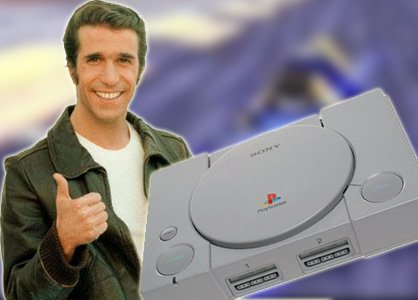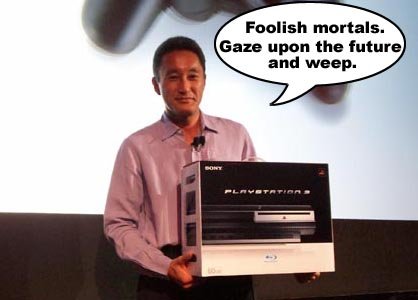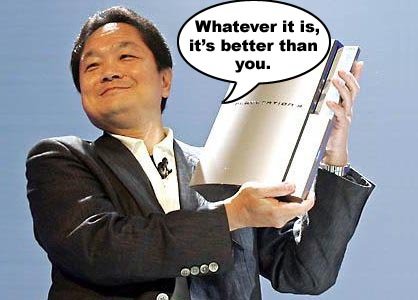The changing faces of the big three
Who got better, who got worse and who screwed it up completely
The first iteration of Sony was completely unlike anything ever seen before in gaming. Blending fun with adult sophistication, everything about the presentation of the PS1 said "Your games have grown up". Phil Harrison was professional, but young, enthusiastic and relaxed when addressing either public or the press. Ken Kutaragi was charismatic, forthright, and a little bit nuts. Kaz Hirai looked like he'd just stepped out of Tekken. These were execs its was okay to like, and they did a great job of putting across the PlayStation as a legitimate purchase for cool grown-ups who still wanted to have fun.

The marketing backed up that conceit beautifully. Sony made a point of advertising in as many socially acceptable, mainstream and cool cultural hotspots as possible, with ads turning up at major sporting events and demo consoles even appearing in nightclubs. Playing Wipeout in the latter environment was a genius way of convincing the world's young adult ravers that the PlayStation was truly an extension of their own, pre-existing culture.
And the ads themselves did a brilliant job of striking exactly the right tone. Clever, funny and subversive, they often had TV-rivaling production values and directorial talent, and always addressed their audience with a sly nod and a wink, even when selling a product like Final Fantasy or Spyro. Whether you were a new player or someone who'd grown up with the conventions of gaming, Sony was very, very appealing indeed. Sure, the later PS2 ads might have eschewed actual game content in favour of pretentious weirdness, but by that point the PlayStation had become a hipster lifestyle statement, so fans were willing to go along with it regardless.

After more than ten years of success, the Sony that unveiled the PS3 at E3 '06 was unashamedly arrogant and complacent. The PlayStation wasn't just the cool, subversive new wave of gaming any more; it was the one true path of gaming and its new machine was a prestige badge of honor that players couldn't afford to be without. And at 599 US dollars, Sony didn't care that few players could afford to be WITH it either. The machine was a symbol of power and excess, and there was simply no question that you had to have one.

With comments like "The next generation doesn't start until we say it does" and statements that the PS3 would instill discipline into the world through customers' need to work harder to afford one, Sony were selling the console as the be all and end all of the industry and itself as gaming's lord and master, to who all gamers must kneel if they still wanted to be part of it. This wasn't the fun and sophisticated Sony of old; it was a hard line, hardcore manifesto. With the 360 having taken ground for around a year already, it's understandable that Sony wanted to reassert itself, but everything about its promotion of the PS3, from supposed "supercomputer" hardware specs to its off-hand disregard of Microsoft just screamed exclusivity and elitism.

Following the inevitable backlash - not to mention the success of two very different rival consoles - Sony's marketing was all over the place for a while, and it seemed not even the machine's creator knew what to sell it as. It was a supercomputer. Or it was a simple console. Or it wasn't a games machine at all, it was a multimedia hub. Whatever it was though, Sony's self-assured attitude and insistence that we'd all eventually see the light remained.

But now, things have changed. As it became increasingly clear that the 360 and Wii weren't going to fall, Sony started to quieten down, and we now have a less cocky, more humble company. There's still an element of elitism, but now that persona comes largely from the machine and its content rather that showboating execs. Sony has done a good job of building a solid library of more sophisticated, artistically worthy titles, particularly through PSN download games, in some ways reverting to its original "games for grown-ups" manifesto, albeit in a more arch manner.
Weekly digests, tales from the communities you love, and more
The ads have also improved, with a noticeable shift between the irritatingly self-indulgent nonsense of the PS3's original "This is living" campaign and the game content and fun of the recent European LittleBigPlanet ads. The tone is part old Sony and part reaction to Microsoft and Nintendo's new caring, sharing approach, but with substance as well as style these days, the company that launched a thousand memes is making itself a lot easier to like.
Click on. It's time for Nintendo. Tissues at the ready.



